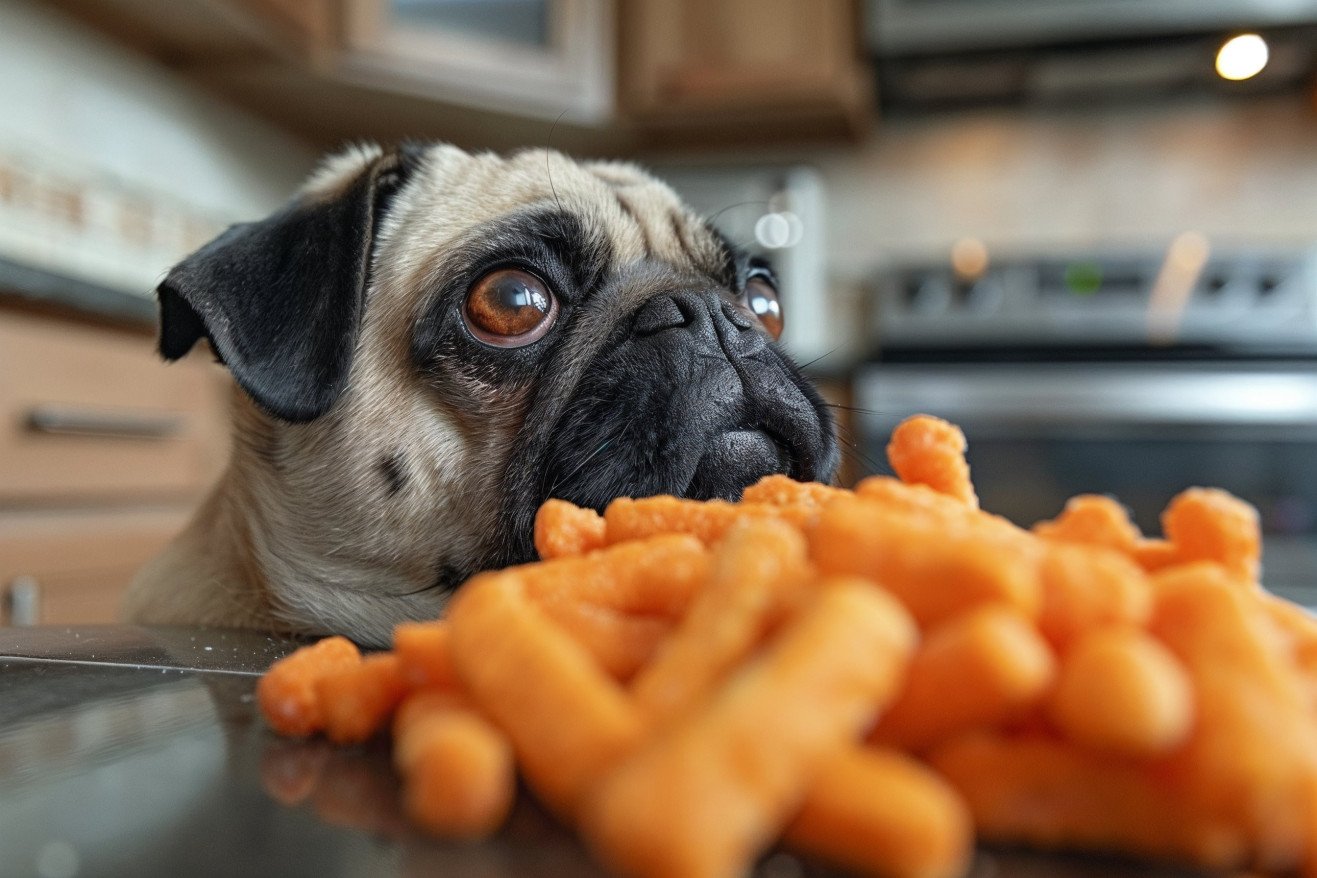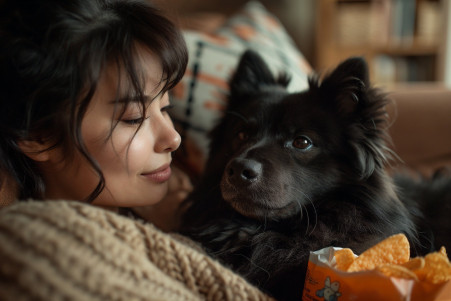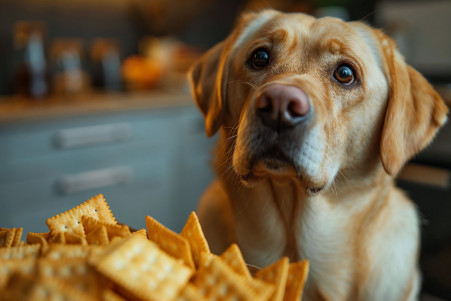Can Dogs Eat Cheetos? The Risks of Feeding Your Pup This Snack
25 April 2024 • Updated 24 April 2024

While you may want to share your favorite junk food with your dog, can dogs have Cheetos? While a single Cheeto is not likely to be dangerous to your dog, it's not a good idea to give dogs this human treat regularly because of the high fat, salt, and artificial content, which can cause digestive problems and other health concerns in dogs.
This article will explore the most up-to-date findings from veterinary nutritionists and other animal professionals about the potential dangers and impacts of feeding dogs Cheetos and other similar snacks on a regular basis. By looking at research and expert opinions, you will get a full picture of why these delicious snacks are not recommended for dogs and also find some healthier alternatives that are safe for your dog to eat.
Can dogs eat Cheetos?
The Dangers of Feeding Cheetos and Other Junk Foods to Dogs
While an occasional Cheeto may not seem overly concerning, regularly feeding these salty, fatty snacks to dogs can pose serious health risks. As Dr. Rosslyn Biggs, an Oklahoma State University veterinarian, warns in an OSU Extension article, salty snack foods like Cheetos contain excessive amounts of sodium that can lead to vomiting, diarrhea, tremors, elevated body temperature, seizures, and even death in pets.
The high fat content in Cheetos and similar junk foods is also a major concern. According to Bond Vet, ingesting too much fatty food can trigger pancreatitis, a potentially fatal inflammation of the pancreas that causes vomiting, diarrhea, and abdominal pain in dogs. Even without pancreatitis, excessive fat intake promotes obesity and related health issues like heart disease and diabetes.
Beyond the risks of salt and fat, many junk foods contain artificial colors, flavors, and preservatives that can trigger allergic reactions or digestive distress in some dogs, as noted by Purina. Large quantities of these unhealthy snacks deprive dogs of essential nutrients while increasing their risk of developing chronic conditions like certain cancers. Clearly, regularly feeding Cheetos and similar human junk foods to dogs can have severe, potentially life-threatening consequences.
Safe and Healthy Human Foods for Dogs
In addition to the many foods dogs should not eat, there are also a number of human foods that are safe and healthy for dogs to eat in moderation as an occasional snack. For example, lean meats like cooked chicken, turkey, or fish can be a good source of essential amino acids and other nutrients for dogs, according to the American Kennel Club.
Fresh fruits and vegetables, including carrots, apples, blueberries, and green beans, can provide dogs with important vitamins, minerals, and fiber, according to Healthline. Whole grains like cooked and unseasoned brown rice, oatmeal, and quinoa can be a good source of complex carbohydrates and fiber for dogs, according to the American Kennel Club.
That said, it's important to steer clear of feeding dogs foods that are toxic or potentially dangerous, including onions, garlic, chocolate, grapes, raisins, and foods that are high in salt or sugar, according to Healthline. By making sure to only feed dogs safe and healthy human foods in moderation, you can make sure your pet has access to tasty and nutritious snacks.
Homemade Dog Treat Recipes: Healthy and Delicious Alternatives
For dog owners who are looking to give their pups healthy and delicious treats, homemade dog treats are a great alternative to store-bought options. With recipes that include ingredients like peanut butter, bananas, oats, and pumpkin puree, dog owners can make healthy and tasty treats for their pets, as demonstrated by recipes from The Cookie Rookie, The Recipe Critic, and It Doesn't Taste Like Chicken.
Homemade treats also allow dog owners to know exactly what's in their dog's treats and avoid artificial ingredients, preservatives, and high levels of salt and sugar. However, dog owners should make sure to use dog-friendly ingredients and avoid any foods that are toxic to dogs, such as xylitol and nutmeg. In addition, homemade dog treats should be stored in the refrigerator or freezer to ensure that they last and stay fresh.
How to Switch Your Dog to a Healthy Diet
If your dog has been eating a diet of junk food like Cheetos, it's important to switch them to a healthy, high-quality dog food. According to PetMD, sudden changes in diet can cause stomach issues, so it's best to switch your dog's food over the course of 7-10 days.
The American Kennel Club suggests starting with a small amount of the new food mixed in with the old food and increasing the amount of new food while decreasing the old food over the course of the switch. It's important to pay attention to your dog's poop and overall health during this time, and if you notice any issues, including stomach problems, contact your vet.
After the switch, Raised Right recommends not feeding your dog junk food and instead sticking to healthy treats in moderation. By making sure your dog is healthy and eating a balanced diet, you can make sure they live a long, healthy life.
Conclusion: Make Sure Your Dog's Health Comes First
Even though it may be fun to share human snacks like Cheetos with your dog, it's important to make sure that you're focusing on your dog's health and well-being by making sure that they're eating a balanced, nutritious diet. Regularly feeding dogs unhealthy snacks that are high in fat, salt, and artificial ingredients can cause a number of health problems, including digestive issues, obesity, and chronic health conditions.
Make sure that you're feeding your dog a high-quality dog food and giving them healthy, dog-safe treats in moderation to make sure that they're as healthy as possible in the long run. Your vet can give you personalized information about your dog's diet and any other concerns you may have about their nutrition or health.


